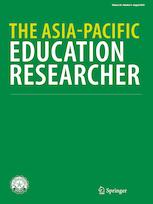| Special Journal Issues - Emotions in Education: Asian Insights on the Role of Emotions in Learning and Teaching Volume 28, Issue 4, 2019 The Asia-Pacific Education Researcher
|
||||
|---|---|---|---|---|
Theme |
The aim of this special issue is to uncover the role of emotions in educational contexts with a special focus on the domains of learning and teaching. The focus on Asian research will help illuminate how the unique Asian sociocultural context influences the dynamic interplay among emotions, learning, and teaching. The special issue is organized into two sections. The first section focuses on student emotions and their role in the learning process. The second section of the special issue is about the role of emotions in teaching. |
 |
||
Issue
Co-editors |
 |
Dr KING Ronnel Bornasal Assistant Professor Department of Curriculum and Instruction The Education University of Hong Kong China |
 |
Dr CHEN Junjun Assistant Professor Department of Education Policy and Leadership The Education University of Hong Kong China |
| Contributors |
|
|||
|
||||
Perfectionism is multidimensional and includes perfectionistic striving (ceaseless pursuit of very high performance standards) and perfectionistic concerns (excessive self-criticism over one’s inability to live up to unrealistically high expectations). Previous studies generally suggest that both perfectionistic striving and perfectionistic concerns are highly related to emotions; however, little research has been conducted on how perfectionism and its distinct components relate to key academic emotions such as hope towards one’s test performance. This study aimed to examine the relationship between perfectionism and test-related hope, and the mediating role of self-compassion. A sample of Chinese primary students (N = 1051) were recruited to complete measures of perfectionism, self-compassion and test-related hope. Structural equation modeling showed that perfectionistic striving was associated with higher test-related hope, and perfectionistic concerns with lower test-related hope. Partial mediation effects of self-compassion on the relationship between dimensions of perfectionism and test-related hope were also found. The findings contribute to our understanding of how perfectionism is related to emotion constructs in competitive contexts. Implications pertaining to future directions in research and practice will be discussed. |
||||
|
||||
|
||||
|
||||
|
||||
|
||||
|
||||

